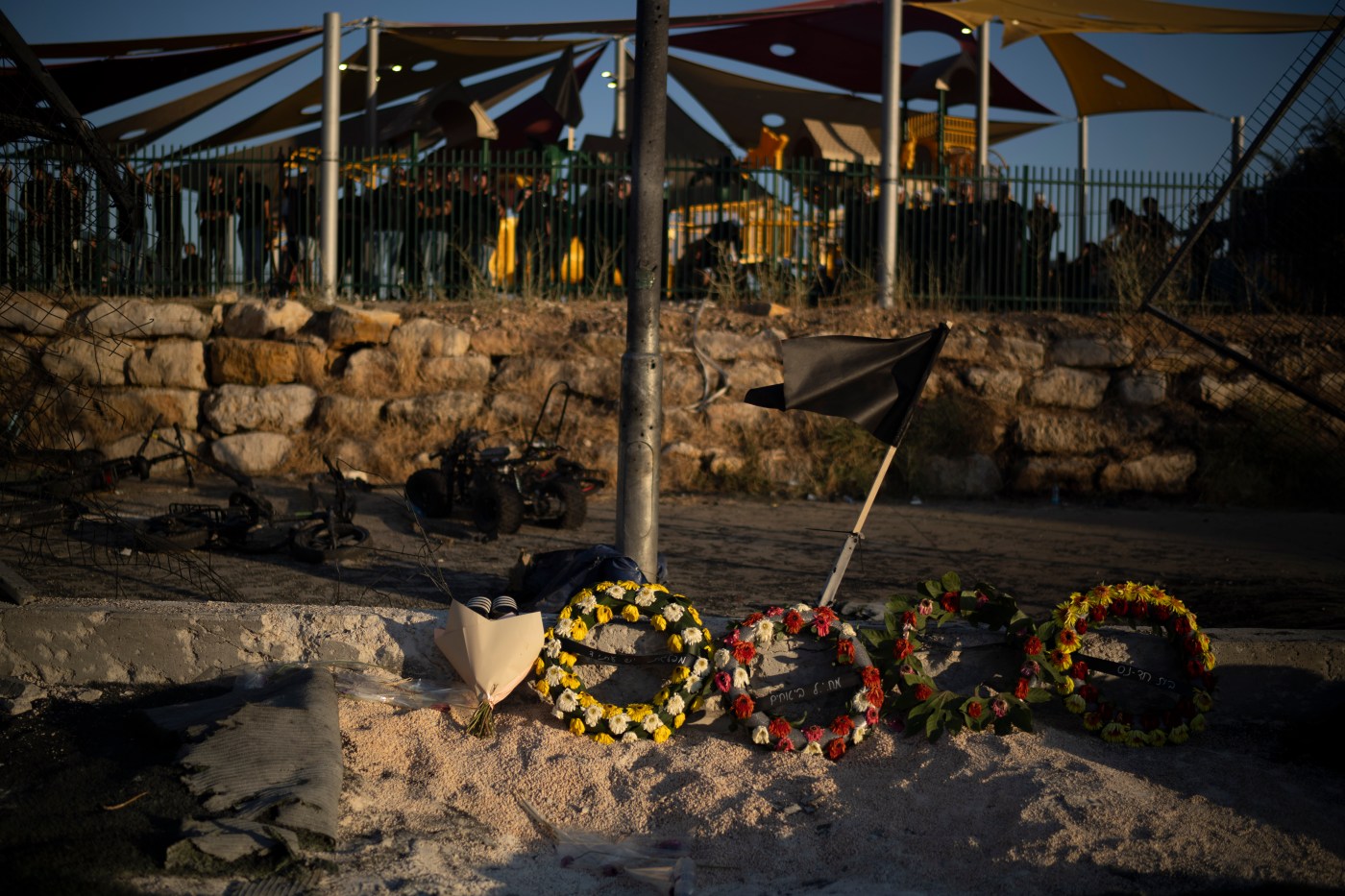
Israel hits Hezbollah for Golan carnage
Israel attacked Hezbollah targets on Sunday and threatened further retaliation for a rocket strike that killed 12 youngsters, while also dispatching a senior envoy to discuss a proposed suspension of the nine-month Gaza war that has ignited the Lebanese and other regional fronts.
Prime Minister Benjamin Netanyahu, returning from a U.S. visit in which he sought to drum up support for what he has described as a showdown between Israel and proxies of its arch-foe Iran, was to hold back-to-back consultations with military chiefs and the security cabinet, his office said.
In the worst single-incident civilian losses for Israel since Hamas-led Palestinians stormed from the Gaza Strip into its southern villages and army bases on Oct. 7, a rocket exploded in the occupied Golan Heights on Saturday, killing 12 youngsters during a soccer game and wounding 44 others.
Israel blamed Hezbollah for the carnage in the Druze town of Majdal Shams, pointing to a model of rocket used by the Iranian-backed militia and to a launch site in southern Lebanon. U.S. Secretary of State Antony Blinken said during a visit to Japan that there was “every indication” the rocket came from Hezbollah.
Hezbollah has denied responsibility for the attack.
Some 40,000 people live in the Israeli—occupied Golan. More than half are Druze, an Arab group who practice an offshoot of Islam and who are embraced in Israel. While the Golan Druze have generally not held Israeli citizenship, the Druze in the rest of the country are full citizens who serve in the military and government.
Netanyahu has vowed to exact a “heavy price” from Hezbollah, which has been trading fire with Israel across the Lebanese border in solidarity with Hamas, another Islamist group sponsored by Iran.
Lieutenant-General Herzi Halevi, commander of the Israel Defense Forces, was reviewing operational plans for the northern arena, his spokesperson said, in reference to further action in Lebanon and possibly Syria. The Israel Defense Forces said earlier that its warplanes struck several Lebanese targets overnight.
TA-35 stock benchmark dropped 3%, the most since October, in a sign of market jitters at a potential regional escalation.
But Israel has left the door open to a Gaza truce that could also calm the north — eventually. David Barnea, director of Israel’s foreign intelligence agency Mossad and its principal cease-fire negotiator, flew to Rome on Sunday for renewed talks, an Israeli official told Bloomberg.
Barnea was due to meet his U.S. counterpart, CIA director William Burns, as well as Qatari Prime Minister Sheikh Mohammed bin Abdulrahman Al Thani and Egyptian intelligence chief Abbas Kamel. The two Arab countries have served as mediators between Israel and Hamas.
Diplomacy has stumbled over Hamas’ demand for an end to the Gaza war, which Israel has vowed to continue until Hamas is destroyed. As a first stage of the proposed truce, Israel would recover some of 115 hostages still held by Hamas from the Oct. 7 attack and would release Palestinian prisoners in exchange.
Hezbollah has said its attacks on Israel would cease when the Gaza fighting does. The Houthis of Yemen, another Iranian-aligned group that has been carrying out long-range missile and drone launches at Israel, have given similar terms.
Israel says it can’t compromise with enemies sworn to its destruction and blacklisted as terrorist in the West. But domestic pressure keeps growing for a hostage recovery, and the IDF, which leans on conscripts and reservists, is fatigued.
Amir Avivi, a reserve brigadier general who heads the Israel Defense and Security Forum, a hawkish association of former security officials, said by phone that while Israel is preparing for an eventual war in Lebanon, it won’t start right away.
“Israel is likely to hit Hezbollah military infrastructure right now but is not going to start a full-scale war,” he said. “It would be a big mistake to rush and act without relevant preparation.”
As the rocket struck in the Golan, Netanyahu was wrapping up a high-profile visit to Washington that included an uncompromising speech to Congress defending Israel’s war in Gaza and warning of the threat posed by Iran and its proxy militias, including Hezbollah. He also met President Joe Biden, Vice President Kamala Harris and former President Donald Trump.
The White House condemned the Majdal Shams attack and said it was a priority to end attacks along the Blue Line, the U.N.-demarcated provisional border between Israel and Lebanon.
The European Union’s foreign policy chief, Josep Borrell Fontelles, said he “strongly condemns this bloodbath” and urged “all parties to exercise utmost restraint and avoid further escalation.”
The Golan Heights were part of Syria until 1967, when Israel captured most of the area in the Six Day War. Israel’s annexation in the 1980s was not recognized by most countries, and Syria demands the return of the territory. The U.S. recognized Israeli sovereignty over the area under Trump’s administration in 2019.
Hezbollah has targeted Israel’s north since the Gaza war began, launching more than 6,000 rockets and 300 drones at military and civilian targets. Israel has retaliated with attacks, mostly on southern Lebanon.
Until Saturday, about 20 people in Israel had been killed by Hezbollah attacks since October, most of them soldiers. More than 300 people have died due to Israeli strikes in Lebanon, the majority being Hezbollah members.
Roughly 80,000 people in each of southern Lebanon and northern Israel have had to evacuate their homes.
Israel launched its war against Hamas after the Oct. 7 attacks in which 1,200 people in southern Israel were killed and 250 taken hostage to Gaza. The Hamas-run health ministry in Gaza says the death toll in Gaza has exceeded 39,000. It doesn’t distinguish between militant and civilian casualties.
Hezbollah is far stronger than Hamas was before Oct. 7, with more fighters, missiles and drones. A war would probably be devastating for both Lebanon and Israel, officials from both countries have said. Iran on Sunday warned of unspecified “consequences” of new Israeli attacks on Lebanon.
_____
— Dan William / Bloomberg News (With assistance from Galit Altstein.)
_____
©2024 Bloomberg L.P. Visit bloomberg.com. Distributed by Tribune Content Agency, LLC.
A man stands near a damaged gate around a football pitch after a reported strike from Lebanon fell in Majdal Shams village in the Israeli-annexed Golan area on Sunday. (Photo by Menahem Kahana/AFP via Getty Images)

